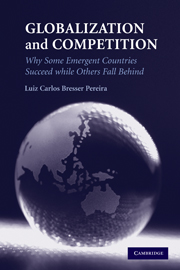Conclusion
Published online by Cambridge University Press: 04 May 2010
Summary
In this book, I have focused on the middle-income countries developing in the framework of commercial globalization and financial globalization. The former is viewed as an opportunity, the latter as a danger or a curse: commercial globalization is an opportunity because middle-income countries dispose of some advantages in international competition, principally low-cost labor; financial globalization is a curse because the country that engages in it loses control of its exchange rate, the rate becomes overvalued, foreign indebtedness grows, foreign savings substitute for domestic savings, and the country is subjected to balance-of-payment crises. My objective has been to develop a theoretical framework able to explain why some emerging countries are successful in catching up but others are not.
Behind the analysis that I developed in this book is today's division of the world's countries into four types: the rich countries; the fast-growing middle-income countries, existing principally in Asia; the slow-growing middle-income countries, existing principally in Latin America; and the poor countries. Middle-income countries are those that have already completed their capitalist revolutions and have a modern state, a market able to allocate resources, and hard-working entrepreneurial and professional social classes. Given that they dispose of cheap labor and are able to copy or buy technology, economic theory predicts that they will catch up. Yet, after the major foreign debt crisis that these countries confronted in the 1980s, they became vulnerable to the pressures and recommendations coming from the North.
- Type
- Chapter
- Information
- Globalization and CompetitionWhy Some Emergent Countries Succeed while Others Fall Behind, pp. 220 - 232Publisher: Cambridge University PressPrint publication year: 2009



